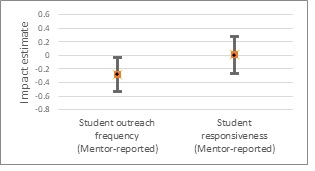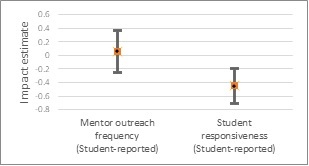Can nudging mentors weaken student support? Experimental evidence from a virtual communication intervention
Does reminding mentors to reach out support virtual communication?
Not necessarily. This study tested the effect of a low-cost, light-touch intervention—mentor reminders—designed to bolster virtual outreach. The study examined impacts on the frequency of student-mentor communication and subsequent impacts on mentoring relationship quality. Unexpectedly, although students did not report receiving more (or less) outreach from mentors who received reminders, compared to mentors that did not receive reminders, treated mentors reported that their students initiated less outreach. In addition, students of treated mentors reported that they were less likely to respond to messages their received from their mentors.


Note: Outcomes standardized to Mean = 1, SD = 0
How to read this chart: The top chart shows that reports of student outreach by mentors who received reminders were 28 percent of a standard deviation lower compared to those of control mentors. The bottom chart shows that students self-reports of responsiveness to mentors’ outreach was 45 percent of a standard deviation lower if their mentors received reminders, compared to reports by students of control mentors.
What were the features of the virtual outreach intervention?
This study was conducted in partnership with Winning Futures, a career mentoring program for students at seven Metro Detroit high schools during the 2019–2020 school year. With the goal of strengthening virtual communication, Winning Futures leaders sent messages to a random half of 143 mentors reminding them to reach out to mentees between in-person sessions. The reminders were sent via email approximately once per month. Each message contained encouragement to reach out, a reminder of program expectations for regular between-session contact, and suggested discussion prompts.
How did we do the study?
These findings come from a randomized field experiment. Each Winning Futures adult volunteer mentored about three students and so the study used a clustered design with half of all mentors randomly assigned to receive monthly reminders (treatment, N=72 mentors, N=252 students) and the other half assigned to “business as usual” (comparison; N=69 mentors, N=242 students). Randomization ensures that differences in outcomes for the groups of students whose mentors did and did not receive reminders are due to the intervention itself and not to student or mentor characteristics. Data sources included student and mentor pre- and post-surveys. Analyses of student-reported outcomes included 171 students (N=80 treatment, N=81 comparison) with complete pre- and post-surveys and analyses of mentor-reported outcomes included 365 students (N=193 treatment, N=172 comparison) whose mentors provided complete responses to both surveys.
What are some of the implications?
This study offers a cautionary lesson about the impact of reminder messages. Not only did the mentor reminders reduce student outreach and responsiveness, mentors who received reminders reported feeling less connected to students and less satisfied with their mentoring relationships. Whereas prior studies show that reminders support the completion of concrete educational tasks—checking a student’s grades online or submitting financial aid paperwork—this study shows that prescribing relational practices may be less effective. In the context of mentoring, this is an important lesson because, even as in-person mentoring resumes as it is safe to do so, some aspects of virtual student support seem likely to remain. For adults whose roles involve student support, multiple points of contact and flexibility are likely a good thing, and to the extent that technology can help with that, virtual outreach should continue. This study suggests, however, that reminding mentors and prescribing discussion prompts may change the quality of their virtual outreach in ways that actually make students less responsive to their support.
Full Article Citation:
Brockman, S.L.. (2023). Can nudging mentors weaken student support? Experimental evidence from a virtual communication intervention Journal of Research on Educational Effectiveness. https://doi.org/10.1080/19345747.2023.2186291
